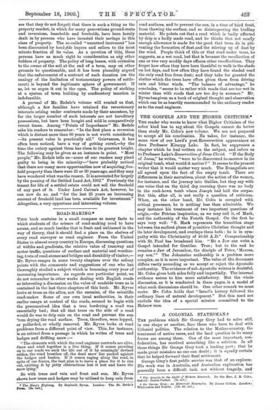THE GOSPELS AND THE HIGHER CRITICISM.* • THE reader whe
wants to know what Higher Criticism of the , sober kind has to say;aliout the Gospele cannot do better than study Mr. Cohn's new volutae. We are not prepared to accept all his conclusions.. Ho takes, for instance, , the same view of our Lord's Pest-Resurrection appearances as does Profeseor Kin-oopp Lake. In fact, he suppresies chapter which he had written on the subject, and refers us to Professor Lake's BSsurrection of Asus Christ. " If the Body of Jesus," he writes, "were, to'be diecovered to-morrow in its original tomb, Whit would it matter ? " It seems to the present writer that it would matter very much. The Evangelists are all agreed upon the faet of the empty tomb. There, are differences in their narratives, about the action of the women, for instance, and the journey into Galilee, but they say with one voice that on the third day.morning there was no body in the rock-hewn tomb where Joseph had laid the corpse. But this, after all, is 'not really a question of criticism. When, on the other hand, Mr. Cohu is occupied with critical processes, he is nothing less than admirable. We may instance -Ida 'treatment of two important questions'ef origin,—the Petrine inspiration, as we may call it, of Mark, and the authorship of the Fourth Gospel. On the first he says 'very well " S. Mark represents the transition stage between the earliest phase Of primitive Christian thought and its laterdevelopment, and overlaps them both : he is in sym- pathy with the Christianity of 40-50 A.D." Companionship with St. Paul has broadened him. "He a Jew can write 'a Gospel intended for Gentiles. True; but to the end he• remains a Jew of Jerusalem, the disciple of Peter, ' Marcus, • my son." 'The Johannine authorship" is a problem more complex, as it is more important. The value of the document differs vastly according as we accept or reject the Apostolic authorship. The evidence of sub-Apostolic writers is doubtful. Mr. Cohn gives both sides fully and impartially. The internal evidence seems' to him more satisfactory. But the whole discussion, as it is conducted in these pages, is a model of what such discussions should be. One other remark we must make. Mr. Cohn holds that "Israel's history followed the ordinary lines of natural development." But this need not exclude the idea of a special mission committed to the Hebrew race.










































 Previous page
Previous page